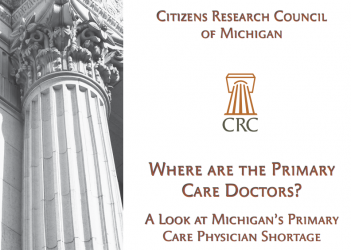
Primary care as delivered by physicians is an integral part of a quality, accessible, and affordable healthcare system. For decades, stakeholders have reported shortages or impending shortages of these types of physicians. With the enactment of the federal Affordable Care Act, Michigan’s decision to expand Medicaid, the aging Baby Boomers, and other policy, demographic, and cultural factors, now is a good time to reexamine the existing network of primary care physicians in Michigan.
Primary care physicians include physicians that serve as the first contact for patients and provide continuous and comprehensive treatment of all types of health conditions. Primary care physicians often take responsibility for the health of their patients even if they are further referred to specialists and may coordinate care for their patients on an ongoing basis. Primary care physicians typically serve in one of the following medical fields: family or general practice, internal medicine, pediatrics, obstetrics and
gynecology, general surgery, or psychiatry.
Shortages of primary care services compromise patient access to sufficient and continuous health care and may drive prices for health care services upward. Additionally, the presence of more primary care physicians in a community is associated with a lower mortality rate indicating that quality of care may also be compromised if sufficient primary care is unavailable.

